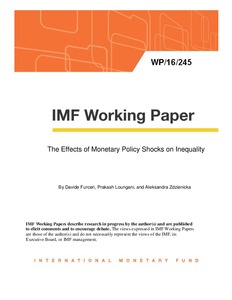The effects of monetary policy shocks on inequality
"This paper provides new evidence of the effect of monetary policy shocks on income inequality. Using a measure of unanticipated changes in policy rates for a panel of 32 advanced and emerging market countries over the period 1990-2013, the paper finds that contractionary (expansionary) monetar...
| Main Authors: | , , |
|---|---|
| Institution: | ETUI-European Trade Union Institute |
| Format: | TEXT |
| Language: | English |
| Published: |
Washington, DC
2016
IMF |
| Subjects: | |
| Online Access: | https://www.labourline.org/KENTIKA-911112473939-The-effects-of-monetary-policy.htm |
| Summary: | "This paper provides new evidence of the effect of monetary policy shocks on income inequality. Using a measure of unanticipated changes in policy rates for a panel of 32 advanced and emerging market countries over the period 1990-2013, the paper finds that contractionary (expansionary) monetary actions increase (reduce) income inequality. The effect, however, varies over time, depending on the type of the shocks (tightening versus expansionary monetary policy) and the state of the business cycle, and across countries depending on the share of labor income and redistribution policies. In particular, we find that the effect is larger for positive monetary policy shocks, especially during expansions. Looking across countries, we find that the effect is larger in countries with higher labor share of income and smaller redistribution policies. Finally, while an unexpected increase in policy rates increases inequality, changes in policy rates driven by an increase in growth are associated with lower inequality." |
|---|---|
| Physical Description: | 42 p. Digital |

